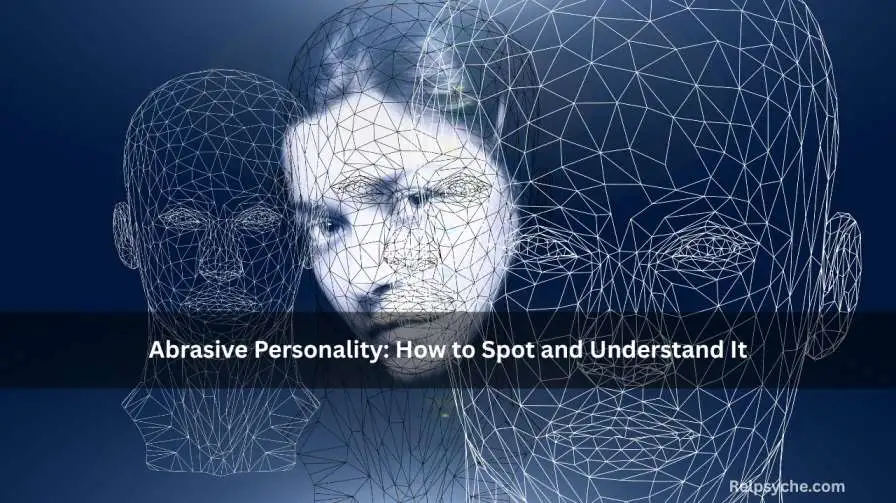Abrasive Personality: How to Spot and Understand It
An abrasive personality means someone acts in a way that feels harsh, rude, or hurtful to others. They may say things that seem too honest or speak without thinking about other people’s feelings. These people are not always bad. They just have a way of talking or acting that can push others away.
Some people with this personality don’t even know they are being too rough. Others may feel they are just “being real” or “telling the truth.” But to the people around them, it can feel painful or upsetting.
Table of Contents
Signs of an Abrasive Personality
Here are a few signs someone may have an abrasive personality:
- They speak without thinking about others’ feelings
- They often interrupt or talk over people
- They think they are always right
- They don’t say “sorry” easily
- They act like they don’t care what others think
This personality can be found at home, at school, or at work. It’s not about being mean on purpose. Sometimes it comes from stress, fear, or a need to feel in control.
Why Do People Become Abrasive?
There are many reasons why someone may act this way:
- Past hurt or trauma
- Low self-esteem (they act tough to hide feeling small)
- Learned behavior (they grew up around people who talked this way)
- Stress or pressure (they feel angry or out of control inside)
People with an abrasive personality might not want to hurt others. They may not know a softer way to talk or act.
How It Affects Others
When someone has an abrasive personality, it can make others feel:
- Scared or nervous to speak
- Hurt or disrespected
- Angry or frustrated
- Not good enough
Over time, people may stop talking to or trusting that person. Friendships and work relationships can suffer.
How to Deal with an Abrasive Personality
If someone around you acts this way, here are some tips:
- Stay calm. Don’t shout back. Stay respectful.
- Set boundaries. Tell them what is okay and not okay.
- Use “I” statements. Say how their words make you feel.
- Be honest. Let them know if something hurt you.
- Ask for space. If things get too much, take a break.
Sometimes, talking helps. Other times, it may be best to limit contact if they don’t change.
Can an Abrasive Personality Change?
Yes, it can change—but only if the person wants to. Change takes:
- Self-awareness (knowing how their actions hurt others)
- Therapy or coaching
- Practice speaking kindly
- Listening more than talking
- Trying to understand others’ feelings
Change is slow, but possible. Some people become more caring once they see how much their actions hurt those they love.

Conclusion
An abrasive personality is not always easy to deal with, but it helps to look deeper. Often, people who act this way are hurting inside or don’t know how to show care. Maybe no one ever showed them how. That doesn’t mean you have to accept hurtful behavior—but understanding can help you make smart choices.
If you are the one with an abrasive personality, there is good news: You can change. Change takes time, effort, and patience, but small steps make a big difference. Learning how to speak with kindness and listen to others can lead to better relationships.
Whether you’re dealing with someone abrasive or trying to grow yourself, remember that kindness, honesty, and calm words go a long way. Everyone deserves to feel safe, heard, and respected—including you.
Ready to take the next step in your personal growth? Explore expert services — from therapy to life coaching — available on Fiverr.
If you want to read more articles similar to Abrasive Personality: How to Spot and Understand It, You Need to Know we recommend that you enter our Self-Growth category.
FAQs
1. Is an abrasive personality the same as being mean?
Not always. A mean person wants to hurt people. Someone with an abrasive personality might just be too honest or speak without thinking. They may not mean harm, but their words or actions can still hurt others. The difference is in the intent and how often it happens.
2. Can kids have an abrasive personality?
Yes, even kids can show signs of this. A child might talk back, act bossy, or not listen to others. It doesn’t mean they’re bad. They may be feeling upset, stressed, or copying what they see at home or school. With gentle teaching and support, kids can learn better ways to act.
3. Can you fix an abrasive personality?
Yes. People can change if they want to. The first step is knowing that their actions are hurting others. After that, they can talk to a therapist, read books, or practice being kind and calm. Saying “sorry,” listening more, and thinking before speaking are all good places to start.
4. Why do some people act so cold or harsh?
Sometimes, people act tough to protect themselves. Maybe they were hurt before and don’t want to feel weak. Others may feel stressed, angry, or like they have to be in control. Being harsh is often their way of handling big feelings they don’t know how to talk about.
5. Should I avoid someone with an abrasive personality?
It depends. If they try to treat you better after you talk to them, it may be okay to stay close. But if they keep hurting your feelings and won’t listen, it’s okay to step away. Your peace and safety matter. Always take care of your mental and emotional health first.

I’m Emma Johnson, a psychologist who loves to write and share ideas.
I enjoy making psychology simple so everyone can understand and use it in daily life.
If you’d like to talk, ask questions, or work together, feel free to reach out.
Let’s learn and grow in the world of psychology together!







